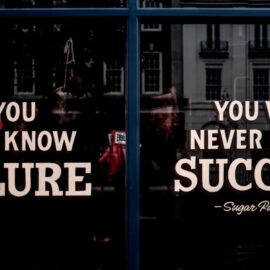

This article is an excerpt from the Shortform book guide to "The Pathless Path" by Paul Millerd. Shortform has the world's best summaries and analyses of books you should be reading.
Like this article? Sign up for a free trial here.
How do the people around you define success? Do they get it right, or do their expectations make you feel like you come up short?
Author Paul Millerd contends that many people hold two mistaken personal beliefs about success. First, you must meet certain cultural benchmarks to be considered successful. Second, there’s a certain “happiness destination” you should aim for.
Read more to learn about these beliefs and what Millerd recommends you embrace instead.
Mistaken Belief #1
Millerd says you might believe that you’ll be judged as successful only if you meet certain socially determined benchmarks. These benchmarks usually represent the accumulation of wealth or social status. For example, some people define success as becoming debt-free. This personal belief about success is mistaken; studies suggest that most people care more about living their values to the best of their ability than adhering to social standards.
(Shortform note: In The Seven Spiritual Laws of Success, Deepak Chopra explains in greater detail why external factors like wealth or social status aren’t good markers of success. He argues that external markers of success are ephemeral, which gives you anxiety and leads you to make unwise decisions in a frantic attempt to hold onto them. For example, you may become willing to step on others to keep a high-paying job that makes you feel important and secure. Chopra says it’s better to prioritize what’s spiritually meaningful to you since the joy you experience from achieving goals that align with those priorities is more sustainable.)
Mistaken Belief #2
Millerd says you might have a mistaken personal belief about success known as the “arrival fallacy.” This is the idea that, once you achieve a given benchmark such as buying a house, you’ll be happy once and for all. When you inevitably find that it doesn’t make you permanently happy, you apply the same thinking to another, loftier goal. Millerd says this is mistaken because nothing can give you permanent happiness.
(Shortform note: Experts explain that the arrival fallacy isn’t just unrealistic—it can also put you at risk for depression. If your expectations about what you’ll feel when you achieve a goal are too high, you become disillusioned when the results aren’t what you thought they’d be, which can lead to a general sense of demoralization. To avoid falling for the arrival fallacy, experts recommend living in the present instead of focusing on future goals, practicing gratitude, and enjoying the process of working toward goals instead of prioritizing the end result.)
Redefine Your Personal Success
Instead of falling for these mistaken beliefs, reinvent success for yourself. Millerd recommends measuring success in terms of contributing something important to the world and living according to your values. He explains that this dynamic process will naturally bring recurrent joy to your daily life, whereas static achievements like home ownership happen one time only and are innately less fulfilling.
(Shortform note: Research on happiness supports the notion that you should measure success in terms of your integrity and your contributions to society. First, living your values helps you prevent cognitive dissonance—an uncomfortable sense that you’re not doing what you should—and achieve cognitive consonance instead, which reduces anxiety and helps you feel like a good person. Second, contributing to society satisfies a basic psychological need. Humans are an interdependent, social species, so feeling connected to others enhances well-being, and studies suggest that helping others is a powerful way to reinforce this sense of connection.)

———End of Preview———
Like what you just read? Read the rest of the world's best book summary and analysis of Paul Millerd's "The Pathless Path" at Shortform.
Here's what you'll find in our full The Pathless Path summary:
- How to take a non-traditional approach to career success through freelancing
- Why Americans prioritize work and the disadvantages of this lifestyle
- One man's inspiring story of shifting from the workforce to freelancing






